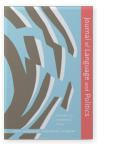Vol. 23:2 (2024) ► pp.219–238
Disalignment in the EU
Disagreement and face threats in international European Committee debates
European Union (EU) institutions are highly multilingual environments where international communication is very goal-oriented, as they produce and define policies and regulations applied to all member states. This paper aims at exploring how disagreements and conflicting opinions are conveyed in such contexts through the qualitative analysis of debates in recorded meetings of the European Parliament Committee on the Environment, Public Health and Food Safety. Two meetings from two different parliamentary terms (2014–2019 and 2019–2024) will be analyzed. The study will adopt a pragma-rhetorical approach, drawing on studies on politeness and conversation analysis techniques and focusing especially on the management of Face Threatening Acts in English turns. Attention will also be paid to language choice, codeswitching, and to the international use of English. Results show that conflict and overt disagreements in the data are very rare, with speakers displaying instead careful mitigation of the language used, especially when English is employed.
Article outline
- 1.Introduction: (un)parliamentary discourse
- 2.Disagreement in deliberative genres
- 3.Multilingualism and codeswitching in the EU
- 4.Data selection and analytical approach
- 5.Results
- 5.1Disagreements and mitigated face-threats
- 5.2Language choice and codeswitching
- 6.Conclusion
- Acknowledgements
- Transcription conventions
- Notes
-
References
